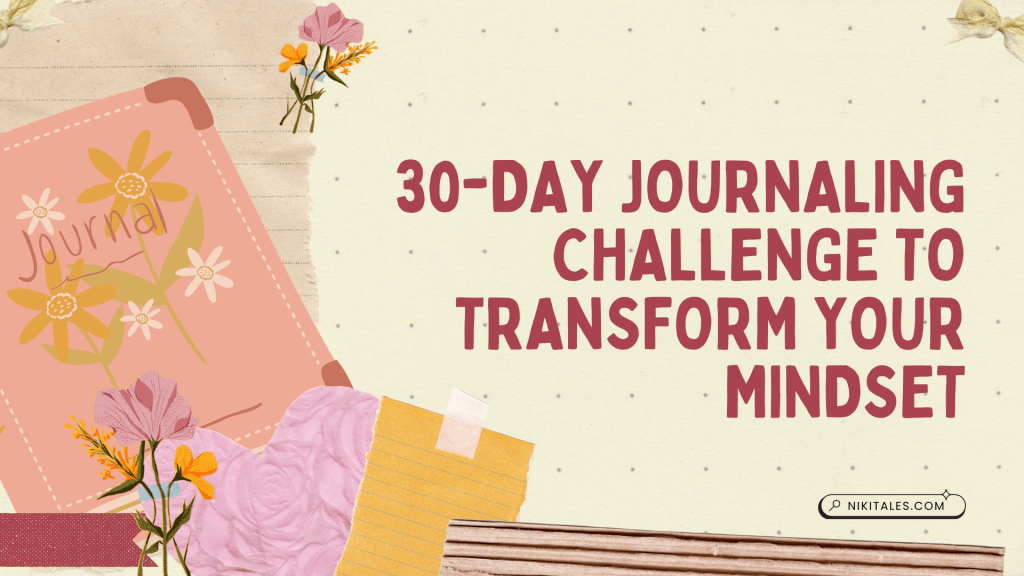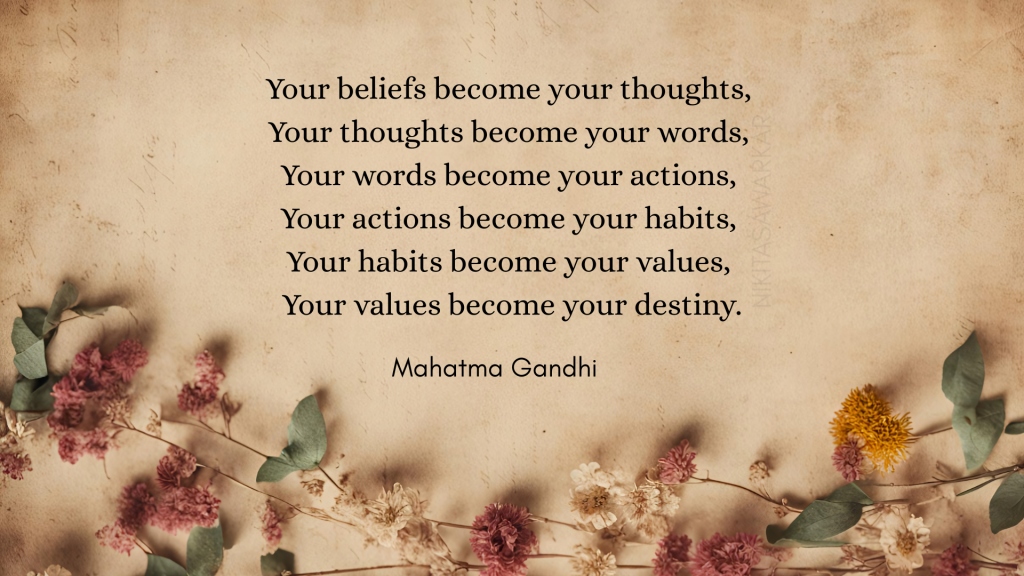Journaling has the power to slow down the chaos and help us reconnect with ourselves. When life pulls us in too many directions, journaling offers a moment of stillness, a space to breathe, reflect, and refocus.
Do you feel that sometimes we have no idea where we’re headed or what’s even going on? Everything feels loud, messy, and overwhelming. That’s exactly when we need to hit pause and check in with our thoughts.
The way we think shapes the way we live. But instead of letting our thoughts run wild, what if we guided them on purpose, with intention?
In my journey, journaling has been the anchor that helps me make sense of things. It’s not just about writing what happened it’s about understanding how I feel, what I believe, and where I want to go next.
New to journaling? No worries. That’s where this guided experience comes in.
This 30-day journaling challenge is your personal roadmap! A prompt for every single day that will help you gain clarity, reset your mindset, and connect with the version of you that’s ready for more.

Why This Challenge Matters
In a world where we are running in a race everyday, it’s easy to feel overwhelmed by stress and self-doubt. These thoughts can hamper our ability to recognize opportunities and foster personal growth.
Journaling transcends mere daily documentation; it’s a powerful tool for engaging in a meaningful dialogue with yourself.
Want to reinvent yourself? Try this Glow up Challenge!
Rewrite Your Inner Narrative
Our minds often repeat negative thoughts, which can lead to self-doubt and harsh self-talk. Writing in a journal can help stop this cycle. When you write down your thoughts and feelings, you can better understand them.
This helps you see which thoughts are not helpful and start to replace them with more positive ones.
Sharpen Self-Awareness
Journaling acts as a mirror, reflecting your inner world. It shows you what’s going on inside your mind. It helps you to understand patterns in your thoughts, emotions, and behaviors that might otherwise go unnoticed.
When you look back at what you’ve written, you can learn more about what drives you, what upsets you, and what matters most to you. This helps you understand yourself and your relationships better.
Encourage Positive Habits
Writing in a journal every day helps you stay mindful and focused. When you take time to think about your day, you can notice your wins, even the small ones.
This builds good habits and helps you make choices that match your goals and values. Over time, it helps you feel proud of your progress and keeps you moving forward.
Boost Emotional Resilience
Life is filled with challenges, and emotional resilience is key to navigating them effectively. Journaling provides a safe outlet to process difficult emotions and experiences.
By confronting and expressing your feelings on paper, you can reduce their intensity and gain a sense of control. Over time, this practice can enhance your ability to cope with stress and adapt to change.
How Journaling Challenge Works
The success of all the journaling challenges is your will power and being consistent. For the next 30 days, you’ll dedicate 15-20 minutes daily to focused journaling exercises.
Each prompt targets a specific aspect of mindset transformation, from gratitude and limiting beliefs to future visioning and personal values.
What you’ll need:
- A dedicated journal (physical or digital)
- 15-20 minutes of uninterrupted time each day
- An open mind and willingness to explore
Let’s begin this journey to transform your mindset!
Week 1: The Discovery Phase
This week is about looking deeper into your daily life to understand your true thoughts, feelings, and actions. Each journal prompt is made to help you learn more about yourself and be more honest with who you are.
Day 1: Unveiling Your Inner Dialogue
Prompt: “What thoughts come to my mind frequently, and what do they tell me about myself?”

Pay attention to the thoughts that often pop up during your day. Are they helpful or harsh? Do they come from things in your past or problems you’re facing now? Spotting these patterns helps you see the deep-down beliefs that affect how you view yourself and everything around you.
Day 2: Emotional Landscape Mapping
Prompt: “Which emotions do I experience most often, and what triggers them?”
Notice which feelings show up most in your day. Are you often worried, happy, annoyed, or peaceful? Think about what situations or thoughts bring these feelings. When you understand your emotional reactions, you can better see what you need and what matters to you.
Day 3: Identifying Personal Triggers
Prompt: “What situations or interactions evoke strong emotional reactions in me?”
Think about the times that made you feel very strong emotions. Is it when someone says something critical? Being in certain places? Or maybe specific people? When you spot these triggers, you can find ways to handle your feelings better and stay more balanced.
Day 4: Authenticity in Daily Life
Prompt: “When do I feel most like the real you during my day?”
Take a close look at what you do each day. When do you feel most real and happy? These times often show what truly matters to you. Seeing these moments can help you live in a way that feels more true to who you are.
Day 5: Recognizing Inauthentic Moments
Prompt: “When do I feel you’re not being my true self, and why does this happen?”
Consider the times when you feel out of sync with your true self. Is it during specific tasks, in certain social settings, or when engaging in particular behaviors? Understanding these moments can help you identify areas for change.
Day 6: Aligning Actions with Values
Prompt: “What can I change in my daily routine to make sure my actions match who I truly am and what I believe in?”

Consider the changes needed to align your actions with your beliefs. This could mean setting boundaries, exploring new interests, or reassessing your commitments. Small, purposeful adjustments can lead to big personal growth.
Day 7: Reflective Integration
Prompt: “What have I learned about myself this week, and how can I use it going forward?”
Take time to synthesize your reflections from the past six days. Identify key takeaways and consider how they can inform your decisions, relationships, and personal development. This integration solidifies your self-discovery journey.
Tip: Start Each Entry with a Mantra!
To set a focused tone for your journaling, begin each entry with a simple mantra. For example, “Today, I uncover…” or “In this moment, I acknowledge…” This practice can help center your thoughts and intentions, making your journaling more purposeful.
Week 2: Confront and Reframe
Now that you’ve reflected on your mindset, it’s time to question any beliefs that might be holding you back. This requires honest self-reflection and the courage to challenge your own thoughts.
Day 8: Identify a Limiting Belief
Prompt: “What belief about myself might be holding me back from reaching my full potential?”

Think about a belief that might be holding you back, whether it’s about your abilities, worth, or potential. Write it down and see how it affects your actions and choices.
Day 9: Explore the Origin
Prompt: “Where did this belief come from, and what experiences have made it stronger?”
Explore the history of this belief. Think about past experiences, messages from others, or societal influences that may have shaped it.
Day 10: Assess Its Impact
Prompt: “How has this belief impacted my choices and actions?”
Look at how this belief has shaped your life. Has it stopped you from seizing opportunities or made you doubt yourself?
Day 11: Challenge Its Validity
Prompt: “Is this belief based on facts, or is it just a fear or assumption?”
Evaluate the belief. Look for evidence that supports or contradicts it. Is it based on facts or just a fear-based assumption?
Day 12: Reframe the Belief
Prompt: “What is a more empowering belief I can adopt in place of this one?”
Create a positive statement that challenges the limiting belief. It should reflect your true potential and values.
Day 13: Affirm the New Belief
Prompt: “How can I reinforce this new belief in my daily life?”
Identify actions, affirmations, or habits that can help solidify this new belief. Consider how you can integrate it into your routine.
Day 14: Reflect on the Transformation
Prompt: “What changes have I noticed since challenging and reframing this belief?”
Reflect on any shifts in your mindset, behavior, or emotions. Acknowledge the progress you’ve made and the empowerment that comes with it.
Challenge: The Flip Exercise
For each limiting belief, write its direct, positive opposite on the same page. This exercise, known as the “flip,” helps in visualizing the shift from negative to positive thinking. For example, if your limiting belief is “I’m not good enough,” the flipped affirmation could be “I am capable and worthy.”
Week 3: Cultivating Gratitude & Strength
After confronting limiting beliefs in Week 2, build on that by embracing gratitude and recognizing your inner strength. This week, focus on practices that boost well-being and resilience.
Day 15: Morning Moments of Gratitude
Prompt: “What is one thing this morning that made me smile or feel at peace?”
Start your day by reflecting on a positive moment, no matter how small. This practice sets a positive tone for the rest of your day.
Day 16: Appreciating Personal Strengths
Prompt: “What is a personal strength I utilized today, and how did it impact my actions?”
Recognize and appreciate the strengths you bring to your daily life. This acknowledgment reinforces self-confidence and resilience.
Day 17: Reflecting on Supportive Relationships
Prompt: “Who is someone that supported me today, and how did their support make a difference?”

Express gratitude for the people who contribute positively to your life. Acknowledging their support strengthens your relationships.
Day 18: Overcoming Challenges
Prompt: “What was a challenge I faced today, and how did I navigate through it?”
Reflect on your ability to overcome obstacles. This practice highlights your resilience and problem-solving skills.
Day 19: Celebrating Small Wins
Prompt: “What is a small achievement I accomplished today, and why is it meaningful to me?”
Celebrate your daily victories, no matter how minor they may seem. Recognizing these moments fosters a sense of progress and motivation.
Day 20: Embracing Self-Compassion
Prompt: “How did I show kindness to myself today, and how did it affect my well-being?”
Practice self-compassion by acknowledging the ways you care for yourself. This reflection promotes emotional well-being and self-acceptance.
Day 21: Visualizing Future Strength
Prompt: “What is a future challenge I anticipate, and how can I prepare to face it with strength and resilience?”
Anticipate upcoming challenges and strategize how to approach them confidently. This proactive mindset enhances your readiness and self-assurance.
Action Point: Create a Victory Log
A Victory Log is a dedicated space in your journal to record daily accomplishments, no matter how small . This practice serves as a tangible reminder of your progress and strengths.
How to Start:
- Designate a section in your journal as your Victory Log.
- Each day, list achievements such as “Completed a challenging workout” or “Had a productive meeting.”
- Review your log regularly to reinforce a positive self-image and motivate continued growth.
Week 4: Vision and Action for Tomorrow
Day 22: Envisioning Your Ideal Self
Prompt: “Imagine your life one year from now. Describe your ideal self in detail—what qualities have you developed, what habits have you adopted, and how do you feel about yourself?”
Visualizing your future self helps clarify your goals and the person you aspire to become. This exercise encourages you to think about the attributes and behaviors that align with your values and aspirations.
Day 23: Mapping Your Ideal Day
Prompt: “Outline your perfect day from start to finish. What activities do you engage in, who do you interact with, and how do you feel throughout the day?”

Detailing your ideal day provides insight into the lifestyle and routines that bring you joy and fulfillment. This can guide you in making intentional choices that align with your envisioned life.
Day 24: Identifying Core Values
Prompt: “List your top five core values. How do these values influence your decisions and actions?”
Understanding your core values helps ensure that your goals and behaviors are in harmony with what matters most to you. This alignment fosters a sense of purpose and authenticity.
Day 25: Setting Intentional Goals
Prompt: “Based on your envisioned ideal self and core values, what specific goals can you set to move toward that vision?”
Setting clear, intentional goals provides a roadmap for personal growth. Ensure these goals are specific, measurable, achievable, relevant, and time-bound (SMART) to enhance their effectiveness.
Day 26: Developing Supportive Habits
Prompt: “What daily habits can you implement to support your goals and embody your ideal self?”
Identifying and adopting positive habits reinforces your commitment to growth and facilitates the achievement of your goals. Consider habits that align with your values and desired lifestyle.
Day 27: Creating a Personal Affirmation
Prompt: “Write a personal affirmation that encapsulates your vision and commitment to growth. How can you incorporate this affirmation into your daily routine?”
Personal affirmations serve as powerful reminders of your intentions and can boost motivation and self-belief. Integrate your affirmation into your daily life to reinforce your commitment to personal development.
Day 28: Reflecting on Your Journey
Prompt: “Reflect on the progress you’ve made over the past 28 days. What insights have you gained, and how have you grown?”
Taking time to acknowledge your journey fosters self-awareness and appreciation for your efforts. Celebrate your achievements and recognize the lessons learned along the way.
Day 29: Writing a Letter to Your Future Self
Prompt: “Write a letter to your future self, summarizing your current state, the progress you’ve made, and your hopes for the future.”
This letter serves as a time capsule, capturing your thoughts, feelings, and aspirations. Reading it in the future can provide perspective on your growth and remind you of your journey.
Day 30: Committing to Continued Growth
Prompt: “What practices will you continue to implement to support your ongoing personal development? How will you stay accountable to your growth journey?”
Establishing a plan for continued growth ensures that the progress made during this challenge is sustained. Consider strategies for maintaining motivation and tracking your development.

Tips for Making the Most of Your Journaling Journey
Journaling is about showing up for yourself. To truly experience the mindset shifts you’re aiming for, here are some thoughtful (and doable) tips to get the most out of every page:
1. Consistency is Key
Whatever you do in life, you have to be consistent.
Journaling is not a one day task. You have to nurture your thoughts everyday.
We then learn to choose our thoughts each single day just like we choose our clothes.
Set aside a specific time that naturally fits into your routine, maybe it’s those quiet moments before the world wakes up, or a calming ritual before bed. Even five to ten minutes can be powerful when you make it part of your routine.
Pro tip: Set a recurring reminder or create a cozy journaling nook that invites you in.
2. Embrace Imperfection
This journal isn’t an essay. It’s not a performance. It’s a raw, honest conversation with yourself. You don’t need perfect punctuation or poetic phrasing. You just need truth.
Let go of how it should sound, and focus on how it feels. Messy handwriting, half-sentences, emotional rants-they’re all welcome here.
This journal is your personal sacred space! Own it the way you want it!
3. Mix It Up
Feeling stuck? Switch gears.
Not every journal entry has to be a block of text. Some days, it might look like a doodle, a quick mind map, a pasted photo with a caption, or even a song lyric that captures your mood.
The goal is to connect with yourself. If the words don’t flow, let colors, lines, or textures speak for you.
4. Review and Reflect
Once a week, say every Sunday, flip back through your entries.
Look for patterns: What keeps showing up in your thoughts? What small wins did you forget to celebrate? What moments of insight took you by surprise?
These reflections are gold. They’re proof of your progress, even when you didn’t realize it at the time.
Pro Tip: End each weekly review by writing a short “note to self” with your biggest takeaway or reminder for the week ahead.
Final Thoughts: The Journey Begins Here
You’ve just completed a transformative 30-day deep dive into your own thoughts, beliefs, dreams, and growth! Each word you’ve written is a step closer to the truest version of yourself.
And the beautiful thing? You now have the tools to keep growing, long after Day 30!
If this inspired you, drop a comment, hit like, and share it with a friend for more such content!
